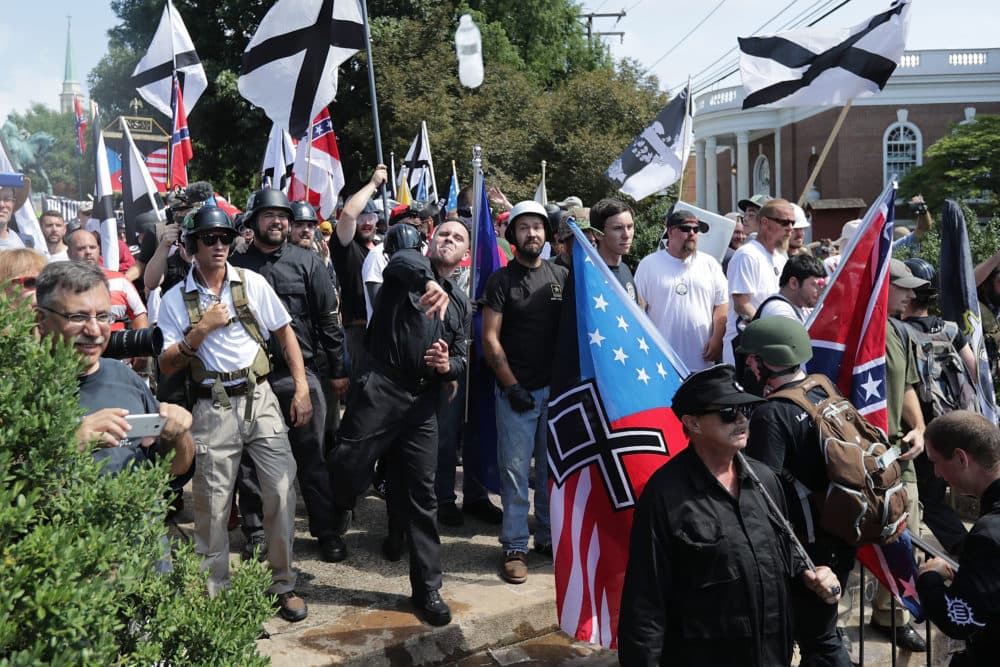Advertisement
Charlottesville Faith Leaders Share Lessons For President Biden

In 2017, former President Trump said there were “very fine people on both sides” when a group of protesters — including white nationalists — marched in Charlottesville, Virginia, and clashed with counter-protesters.
The event was a brazen display of racism and anti-Semitism, and it claimed the life of a young woman named Heather Heyer. When President Biden launched his campaign a year and a half later, the first two words of his announcement were "Charlottesville, Virginia."
The ugliness of the “Unite the Right” rally and Trump's response helped inspire Biden's bid for the presidency. But as Biden called for unity in his inaugural address last week, many in Charlottesville are still healing from what they call the "summer of hate.”
The people of Charlottesville want to be more than the events of that summer, says Rev. Phil Woodson, associate pastor at First United Methodist Church in the city and one of the counter-protesters at the rally. He believes that bringing justice and equity to the forefront can lead to unity.
“In many ways, we are still a town that's still traumatized and still struggling,” he says, “not only to address these overt attacks by white nationalists but also dealing with systemic white supremacy that permeates through our educational system, our housing systems, health care, policing.”
During the insurrection at the Capitol on Jan. 6, people carried some of the same white supremacist iconography and ideology seen in Charlottesville. The two events are connected by the “unbridled evil of white supremacy on full display” on both days, Woodson says.
It’s painful to see such hateful acts carried out in some cases in the name of Christianity — but his divine hope and joy limit the ache, he says. As a local pastor, his deepest pain stems from bearing witness to how white supremacy has harmed Black, Brown and Indigenous people in Charlottesville.
Woodson pointed out in a recent New York Times article that Biden hasn’t visited Charlottesville, despite claiming that the events inspired his presidential campaign. Like other cities, Charlottesville needs support from the country’s leadership to help solve problems such as providing equitable education, and food and shelter for unhoused people, he says.
“I hope that [members of the Biden administration] come to listen and to learn from the people who have been doing the hard and necessary work of loving each other in this community,” he says. “Charlottesville does not want to be a political backdrop or jumping-off point. We're people just like everyone else across the country who's struggling with these issues and trying to work through these hard things together.”
Advertisement
Three and a half years ago on the day of the “Unite the Right” rally, Diane Hillman was vice-president of Congregation Beth Israel — the only synagogue in Charlottesville.
Outside the synagogue, in broad daylight, there was a sea of Nazi imagery as white supremacists marched and chanted. Torahs were moved to another house for their safety, and an armed guard was hired.
Hillman says she never expected to experience something like this. Since that day, the Jewish community in Charlottesville has evolved but not fully healed.
“I don't know that this is a wound that will ever completely heal. There are too many events in our history going back 50, 100 years that many of us have either experienced personally or through our parents and relatives,” says Hillman, now president of Congregation Beth Israel. “This is just a continuation of what started eons ago.”
The following year, in 2018, a shooting at the Tree of Life Synagogue in Pittsburgh left 11 dead and six wounded. As a Jewish woman, Hillman says she doesn’t feel as safe living in the U.S. compared to before 2017.
“I always felt that I was invisible, that I was in a bubble. l look like a white person and hid behind that bubble. But depending on where you live, people know that you're Jewish based on the way you speak and the way you look,” she says. “I had never felt frightened by that before, and now I'm much more aware of it in a negative way.”
Biden called for lowering the temperature in the country in his inaugural address last week, yet he said that on the site of the insurrection at the Capitol where some participants held and wore anti-Semitic iconography.
Hillman believes unity is possible if people can learn from these troubling events. Some people will realize how dangerous this extremist rhetoric is, she says, but others already understand and fully believe the slogans.
In order to learn, people need to treat those they disagree with kindly and gently, she says.
“We make people defensive about what may or may not be their deep beliefs, and we force them to make those beliefs even deeper than they might have been,” she says. “If we could back away a little bit and begin to educate in a way that's non-threatening, we might make more progress than constant, abrasive fighting.”
Alexander Tuerk produced and edited this interview for broadcast with Todd Mundt. Allison Hagan adapted it for the web.
This segment aired on January 26, 2021.

